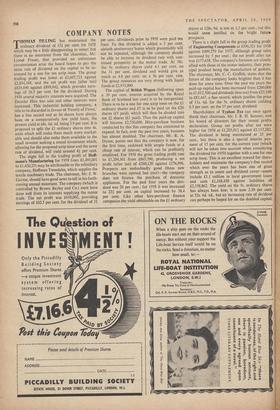COMPANY NOTES
THOMAS TILLING has maintained the ordinary dividend of 131 per cent. for 1958 which may be a little disappointing to some; but there is an assurance from the chairman, Mr. Lionel Fraser, that provided no unforeseen circumstances arise the board hopes to pay the same rate of dividend on the capital to be in- creased by a one for ten scrip issue. The group trading profit was lower at £2,607,723 against £2,894,388, and the net profit was ,(after tax) £829,690 against £899,842, which provides earn- ings of 26.5 per cent. for the dividend. During 1958 several majority interests were acquired. The Daimler Hire was sold and other interests were increased. This industrial holding company, a title to be discarded in favour of 'Family of Firms,' has a fine record and so its- shares have always been on a comparatively low yield basis, the present yield at 68s. 6d. xd. being 3.9 per cent. It is proposed to split the £1 ordinary shares into 4s. units which will make them much more market- able and should also make them available to the small investor seeking a sound investment which, allowing for the proposed scrip issue and the same rate of dividend, will yield around 41 per cent.
The slight fall in the trading profit of Hoff- mann's Manufacturing for 1958 from £1,493,601 to £1,420,251 may be attributable to the subsidiary company, Hoffman Tweedales, which supplies the textile machinery trade. The chairman, Mr. J. W. Garton, should have good news to tell in his forth- coming annual statement. The company (which is controlled by Brown Bayley and Co.) must have done well from its interests supplying the motor trade. The net profit was £610,002, providing earnings of 102.5 per cent. for the dividend of 31 per cent. (dividends prior to 1958 were paid tax free). To this dividend is added a 5 per cent. sixtieth anniversary bonus which presumably will not be repeated, although the company should be able to increase its dividend rate with con- tinued prosperity in the motor trade. At 38s. the 5s. ordinary shares yield 4.1 per cent. on the 31 per cent. dividend and would give as much as 4.8 per cent. on a 36 per cent. rate. The group resources are very strong with liquid funds at £2,933,000.
The capital of British Wagon (following upon a 39 per cent. interest acquired by the Royal Bank of Scotland last year) is to be reorganised. There is to be a one for one scrip issue on the £1 ordinary shares and £5 is to be paid on the £20 shares (£5 paid), which will then be divided into ten £2 shares (£1 paid). Thus the paid-up capital will become £2,550,000. Hire-purchase business conducted by this fine company has continued to expand. In fact, over the past two years, business has almost doubled. The chairman, Mr. R. A. Dyson, points out that the company is now, for the first time, endowed with ample funds at a cheap rate of interest, which can be profitably employed. For 1958 the gross trading profit rose to £1,204,361 from £865,590, producing a net profit (after tax) of £260,120 against £176,996. Prospects are undoubtedly good (three new branches were opened last year)—the 'company does not finance the purchase of domestic appliances. For the past four years the divi- dend was 20 per cent.; for 1958 it was increased to 22+ per cent. on capital increased by 38.4 per cent. Like other hire-purchase finance companies the yield obtainable on the £1 ordinary shares at 128s. 9d. is low at 3.5 per cent., but this would seem justified on the bright future prospects.
There is a slight fall in the group trading profit of Engineering Components at £396,321 for 1958 against £409,279 for 1957, although group sales increased by 5 per cent.; the net profit after tax was £157,658. The company's fortunes are closely allied with those of the motor industry, their prin- cipal product being the manufacture of gaskets. The chairman, Mr. C. C. Griffith, states that the future of the company looks brighter than it has done for some time. Over the past ten years the paid-up capital has been increased from £200,000 to £1,012,500 and dividends (less tax) from £23,100 to £83,447, a fine record, which justifies the price of 11s. 6d. for the 5s. ordinary shares yielding 6.5 per cent. on the 15 per cent. dividend.
Shareholders of Typhoo Tea can once again thank their chairman, Mr. J. R. H. Sumner, and his board of directors for their recent profits declaration. Group net profits after tax were higher for 1958 at £1,203,012 against £1,117,282. The dividend is being maintained at 25 per cent., but there is also a special interim pay- ment of 15 per cent. for the current year (which will not be taken into account when considering the dividend for 1959) together with a one for one scrip issue. This is an excellent reward for share- holders and maintains the company's fine record which over the years has been one of great strength as to assets and dividend cover—assets include £1.1 million in local government loans and cash £1,168,430 against liabilities of £2,358,862. The yield on the 5s. ordinary shares has always been low; it is now 2.39 per cent. at 52s. 6d. xd., but an increasing rate of dividend can perhaps be hoped for on the doubled capital.






































 Previous page
Previous page